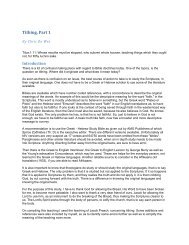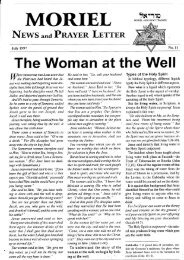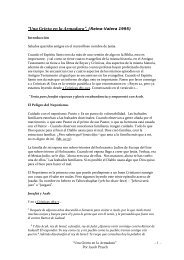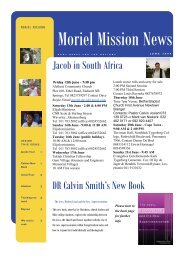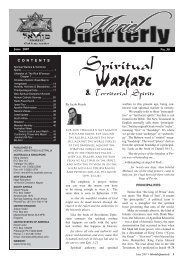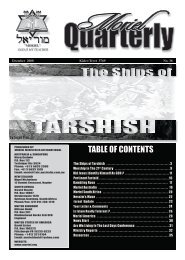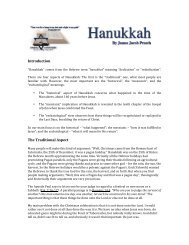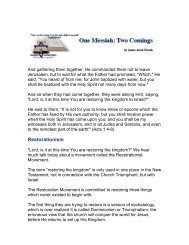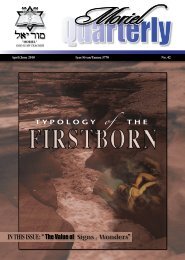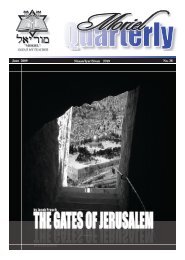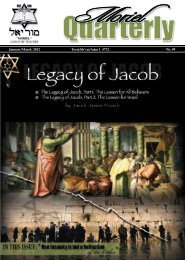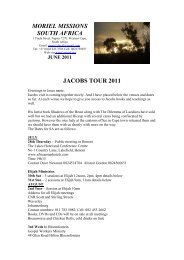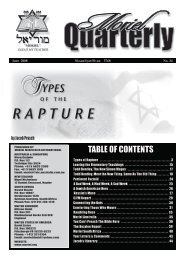The Boiling Pot - Moriel Ministries
The Boiling Pot - Moriel Ministries
The Boiling Pot - Moriel Ministries
Create successful ePaper yourself
Turn your PDF publications into a flip-book with our unique Google optimized e-Paper software.
All That Can Be Shaken – Continued<br />
which is a Slavic country. Take Austria,<br />
which is a Germanic country, and Italy,<br />
which is a Latin country. What is the only<br />
thing that a Polish person, an Irish person,<br />
an Austrian person and an Italian person all<br />
have in common? It is not language, not<br />
culture, not history, it is not cuisine; there is<br />
only one thing they have in common, which<br />
is Catholicism. A Pontiff is needed to create<br />
stability between disparate people. <strong>The</strong> same<br />
thing took place during the Roman Empire<br />
and it will happen again in the Last Days.<br />
<strong>The</strong> Past Reveals the Future<br />
But also understand what else happens.<br />
When Jesus came the first time there was a<br />
general named Octavius who took the name<br />
Caesar Augustus. Other emperors had been<br />
deified posthumously, but Caesar Augustus<br />
was deified in his lifetime by the Senate; he<br />
was worshiped as god. And what happens?<br />
He assigns a number to people—he took a<br />
census when Jesus was born. This is a type<br />
of the Antichrist. Someone is going to come<br />
in the character of these deified emperors<br />
who is going to actually number people for<br />
the same reason, to have economic control<br />
of the known world just as the emperors<br />
did; that is why they did this.<br />
In other words, we have to understand the<br />
early Church in the first coming of Christ to<br />
understand His return. We have to understand<br />
the events surrounding 70 AD and the<br />
Book of Hebrews to understand what is going<br />
to happen in the Last Days. To learn the<br />
future, first learn the past. If we do not know<br />
what happened, we will not know what will<br />
happen; if we understand what happened,<br />
we will understand what will happen. <strong>The</strong><br />
Pontiff said one could have any religion<br />
they wanted as long as they acknowledged<br />
the Pontiff.<br />
Twice there were convocations in Assisi,<br />
Italy held by Pope John Paul II. In attendance<br />
at his invitation were African witch doctors,<br />
Zoroastrian priests, Muslim Imams, rabbis,<br />
the Dalai Lama, Tibetan Buddhists—he met<br />
with everybody. He was the Pontiff—the<br />
“bridge builder,” but four times Pope John<br />
Paul II condemned only one religion. He<br />
did it in Rome, Mexico City, Santo Domingo,<br />
and the first time in 1985 in La Paz, Bolivia:<br />
he condemned Evangelicals, calling<br />
us “rapacious wolves.” This was because<br />
of the large numbers of Catholics becoming<br />
Pentecostals and Baptists in Latin America.<br />
That is what the Pontiff did in the 1 st century,<br />
so that is what the Pontiff does in the<br />
21 st century. If we want to know the future<br />
we must understand the past.<br />
<strong>The</strong>re is going to be a reconfederation of<br />
European countries into a non-democratic<br />
Europe and they are going to need a multireligious<br />
ecumenical system to create an<br />
artificial basis to maintain a social, cultural<br />
and political harmony of these widely different<br />
countries, the same as the Romans did.<br />
So these believers in Israel who received<br />
the Epistle of Hebrews were getting two<br />
kinds of persecution, first by the rabbis and<br />
the Sanhedrin, and now they are also being<br />
persecuted by the Roman government. In<br />
this place, some of them were being tempted<br />
to say that when they were in the synagogue<br />
and the Temple they had a license — they<br />
were religio licita, and that they had blood<br />
atonement through the sacrifices of the animals<br />
through the Levitical sacrificial system.<br />
Some were saying, “Let’s go back to<br />
the Law, let’s go back to the Temple. We’ll<br />
use that for blood atonement.” <strong>The</strong>y were<br />
advocating recanting faith in Jesus as the<br />
Messiah to go back to relying on the Law<br />
and the blood atonement of the Levitical<br />
priests to make atonement for sin. That is the<br />
historical context of what was taking place.<br />
Hebrews warns them that they were forgetting<br />
what Daniel said, forgetting what<br />
Jesus said, that the Temple was going to<br />
be destroyed. (Heb. 9-10) Whenever we<br />
see Christians going back under the Law<br />
they become a cult such as the Seventh-day<br />
Adventists; we cannot live under two covenants<br />
at the same time. Another example<br />
is the extreme elements of the Messianic<br />
Movement; we cannot live under two covenants<br />
at the same time because it becomes<br />
something cultic and heretical. It is the oldest<br />
trick in the book. In the 4 th century, Satan<br />
paganized Christendom, but in the 1 st<br />
century he tried to Judaize it — put it back<br />
under the Law. This is what the Epistle of<br />
Galatians is about and this, in part, is what<br />
Hebrews is about.<br />
<strong>The</strong>y are in this situation where they are<br />
being to go back to the Law to trust for their<br />
salvation in order to not be persecuted. If we<br />
just get religious, we will not be persecuted.<br />
<strong>The</strong> problem is that while we can have religion<br />
and not be persecuted, we cannot<br />
have religion and the assurance of salvation.<br />
Only Jesus can give us the assurance<br />
of salvation, but we might be persecuted,<br />
and if we are not willing to be persecuted<br />
for Jesus, we do not have Him. This is what<br />
Hebrews is saying to us.<br />
When the Heavenlies Shake, the<br />
Earthly Shakes<br />
See to it that you do not refuse Him<br />
who is speaking. For if those did not<br />
escape when they refused him who<br />
warned them on earth, much less will<br />
we escape who turn away from Him<br />
who warns from heaven. And His voice<br />
shook the earth then, but now He has<br />
promised, saying, “YET ONCE MORE<br />
I WILL SHAKE NOT ONLY THE<br />
EARTH, BUT ALSO THE HEAVEN.”<br />
This expression, “Yet once more,”<br />
denotes the removing of those things<br />
which can be shaken, as of created<br />
things, so that those things which cannot<br />
be shaken may remain. <strong>The</strong>refore,<br />
since we receive a kingdom which cannot<br />
be shaken, let us show gratitude,<br />
by which we may offer to God an acceptable<br />
service with reverence and<br />
awe; for our God is a consuming fire.<br />
(Heb. 12:25-29)<br />
It speaks of this impending “shaking”.<br />
For them, in the short term, the “shaking”<br />
was the events of 70 AD which we read<br />
about in Josephus and Eusebius and so<br />
forth, but here it becomes very focused on<br />
the Last Days and begins quoting from the<br />
Old Testament. It begins to warn what is<br />
going to happen about this shaking that is<br />
going to come, and it refers back to Isaiah<br />
and quotes Haggai that everything that can<br />
be shaken will be shaken and so forth: “Yet<br />
once more I will shake not only the earth,<br />
but also the heaven.”<br />
Zechariah, Job, Daniel and Revelation<br />
all show us something. <strong>The</strong> turmoil we see<br />
happening on the earth is merely a reflection<br />
of the conflicts in heaven. Daniel sees<br />
Michael fighting the Prince of Persia. (Dan.<br />
10:13) This has political ramifications upon<br />
the earth. Daniel 10 tells us that in the final<br />
conflict, Persia—Iran, will rise up against<br />
Israel. But we do not struggle against flesh<br />
and blood (Eph. 6:12)—it is not Ahmadinejad,<br />
it is what is controlling him, the prince<br />
with the power over Persia. People call it<br />
“territorial spirits”— that is a bad translation<br />
of the more accurate term “principalities”.<br />
What we see happening in the Middle<br />
East is merely a reflection of battles in the<br />
heavenlies as Daniel saw.<br />
We see the same thing in Revelation:<br />
there is a battle in the heavenlies. What was<br />
happening to Job on earth was a reflection<br />
of what was happening in heaven when Satan<br />
was accusing him. What was happening<br />
in the days of Ezra, Nehemiah and Haggai<br />
was simply a reflection of what was happening<br />
before the throne of God in Zechariah.<br />
Zechariah opens up the curtain to show<br />
us what is happening in heaven at the same<br />
time these events are happening on earth.<br />
Daniel shows us what is happening in heaven<br />
at the same time these political events<br />
happen on earth. Revelation shows us both<br />
what is happening in heaven and what is<br />
happening on earth. <strong>The</strong>se events we see<br />
in the Middle East today are all ramifications<br />
of a spiritual battle in the heavenlies.<br />
Jerusalem is where Satan received his biggest<br />
defeat and it is where he will receive<br />
his final defeat; there is a spiritual battle.<br />
<strong>The</strong> physical, military conflicts are simply<br />
the ramifications of something spiritual taking<br />
place and is much of what the Book of<br />
Daniel is about.<br />
30 <strong>Moriel</strong> Quarterly • June 2012




